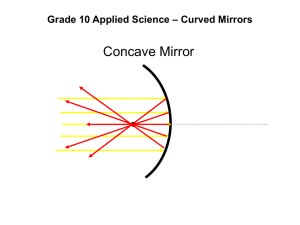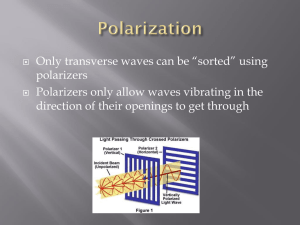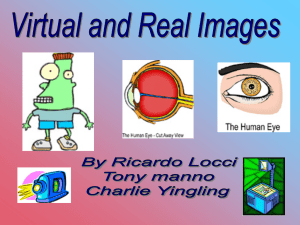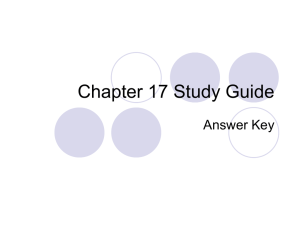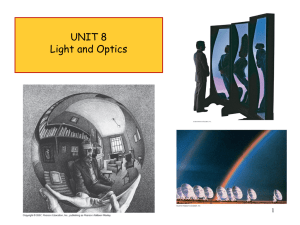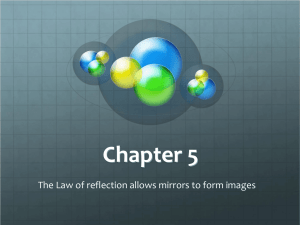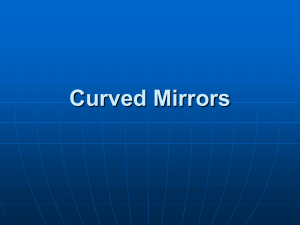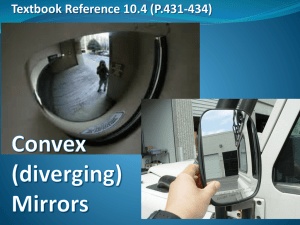convex mirror
advertisement
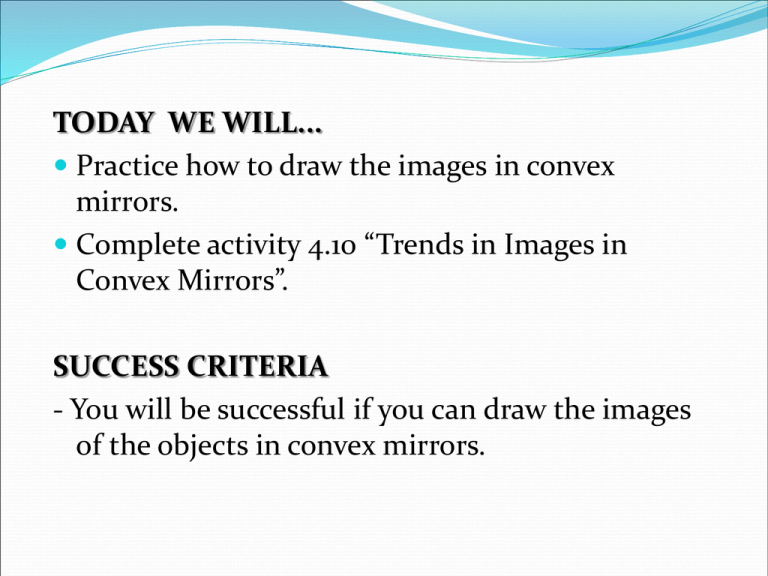
TODAY WE WILL... Practice how to draw the images in convex mirrors. Complete activity 4.10 “Trends in Images in Convex Mirrors”. SUCCESS CRITERIA - You will be successful if you can draw the images of the objects in convex mirrors. Textbook Reference 4.4 (P.318-321) Convex mirrors are useful as security mirrors in stores and sideview mirrors on vehicles. Convex mirrors always form images that are smaller than the object. A convex mirror is a mirror that bulges out in the centre. The surface of a convex mirror is shaped like the surface of the outside of a ball. A convex mirror lets you see in more directions. This is illustrated in the image from the security mirror shown below. Copyright © 2010 McGraw-Hill Ryerson Ltd. Convex mirrors always form images that are smaller than the object. A convex mirror has a focal point and a centre of curvature just like a concave mirror does, but they are found in a different way. When rays travel toward a convex mirror parallel to the principal axis, the reflected rays spread out. Reflected rays must be extended backward, behind the mirror to find the focal point. The centre of curvature (C) is twice the distance from the mirror as the focal point (F). Copyright © 2010 McGraw-Hill Ryerson Ltd. Ray Diagrams for Convex Mirrors The rays used to draw a ray diagram for a convex mirror are similar to those for a concave mirror. However, because the focal point is behind the mirror, rays never go through it. Copyright © 2010 McGraw-Hill Ryerson Ltd. Ray Diagrams for Convex Mirrors The two rays for convex mirrors: • A ray travelling parallel to the principal axis will reflect as though it was coming from the focal point. (A) • A ray that is travelling as though it is going through the focal point will reflect back parallel to the principal axis. (B) Copyright © 2010 McGraw-Hill Ryerson Ltd. ACTIVITY 4.10 Pg. 321 TRENDS IN IMAGES IN CONVEX MIRRORS You will draw ray diagrams for objects at different distances from a convex mirror and compare the images. What do you think will happen to the size of the image as the object moves farther from the mirror? Ray Diagrams for Convex Mirrors Copyright © 2010 McGraw-Hill Ryerson Ltd. Ray Diagrams for Convex Mirrors Copyright © 2010 McGraw-Hill Ryerson Ltd. Ray Diagrams for Convex Mirrors: SALT The image of an object in a convex mirror will have the following characteristics: • SIZE: image is smaller than the object • ATTITUDE: the image is upright • LOCATION: the image is closer to the mirror than the object is • TYPE: the image is virtual The images in convex mirrors are much more similar to each other than those in concave mirrors. Copyright © 2010 McGraw-Hill Ryerson Ltd. Activity 4.10 – What did you find out? 1. Which image was LARGER ... The image with the object closer to the mirror, or the object farther from the mirror? 2. Which image was CLOSER to the mirror ... The image with the object closer to the mirror, or the object farther from the mirror? 3. Write a statement that describes the trends in size and location for an image in a convex mirror as the object moves away from the mirror. - Images in convex mirrors are always smaller than the object. - Images in convex mirrors decrease in size, and get closer to the focal point, as the object moves farther from the mirror. Topic 4.4 Review Key concepts to be reviewed: • The angle of reflection is equal to the angle of incidence. • Plane mirrors form images that are nearly identical to the object. • Concave mirrors can form real, inverted images. • Concave mirrors can form upright, virtual images. • Convex mirrors always form images that are smaller than the object. Copyright © 2010 McGraw-Hill Ryerson Ltd.
